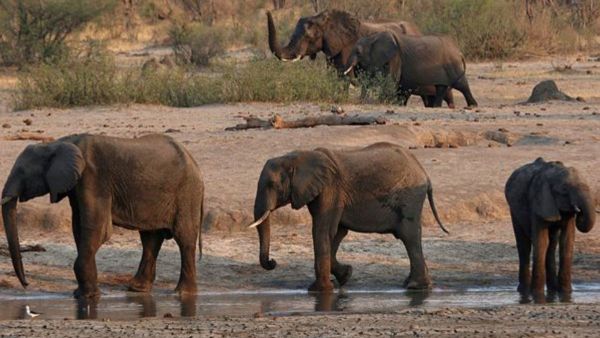Zimbabwe to cull 200 elephants to aid communities hit by drought
Zimbabwe plans to cull 200 elephants to provide food for communities severely impacted by the worst drought in four decades, wildlife authorities announced on Tuesday.
The El Nino-induced drought has devastated southern Africa, leading to widespread crop failures and leaving 68 million people facing food shortages across the region.

“We can confirm that we are planning to cull about 200 elephants across the country. We are working on the modalities of how we are going to do it,” Zimbabwe Parks and Wildlife Authority (Zimparks) spokesperson Tinashe Farawo told Reuters. He explained that the elephant meat would be distributed to drought-affected communities in Zimbabwe.
This marks the first elephant cull in Zimbabwe since 1988 and will take place in districts including Hwange, Mbire, Tsholotsho, and Chiredzi. The decision follows Namibia’s recent move to cull 83 elephants, distributing the meat to people similarly impacted by the drought.
 The decision follows Namibia’s recent move to cull 83 elephants, distributing the meat to people similarly impacted by the drought. (Reuters)
The decision follows Namibia’s recent move to cull 83 elephants, distributing the meat to people similarly impacted by the drought. (Reuters)
Southern Africa is home to one of the world’s largest elephant populations, with over 200,000 elephants living across a conservation area that spans Zimbabwe, Zambia, Botswana, Angola, and Namibia.
Farawo stated that the culling is also intended to ease pressure on Zimbabwe’s national parks, which can only support 55,000 elephants, while the country currently has over 84,000.
“It’s an effort to decongest the parks in the face of drought. The numbers are just a drop in the ocean because we are talking of 200 (elephants) and we are sitting on plus 84,000, which is big,” he added.
The severe drought has increased human-wildlife conflicts, with 50 people in Zimbabwe killed by elephants last year.
Zimbabwe, known for its conservation efforts and successful growth of its elephant population, has been advocating for the UN’s Convention on International Trade in Endangered Species (CITES) to lift the ban on the sale of ivory and live elephants.
The country currently holds around $600 million worth of ivory stockpiles that it is unable to sell.
(with inputs from Reuters)
Disclaimer: The copyright of this article belongs to the original author. Reposting this article is solely for the purpose of information dissemination and does not constitute any investment advice. If there is any infringement, please contact us immediately. We will make corrections or deletions as necessary. Thank you.





